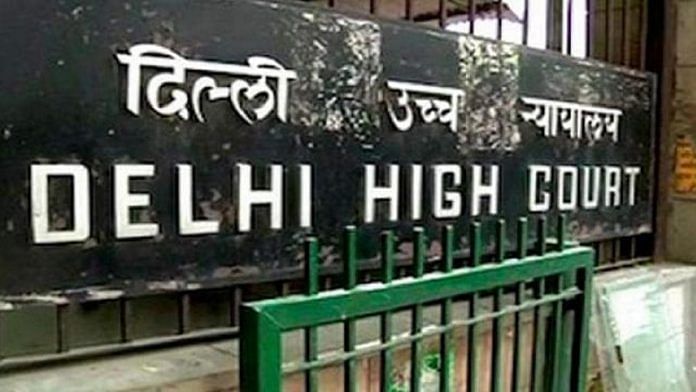New Delhi: Rejecting the Bank of Baroda’s argument that an “act of God”, in the form of high-velocity winds, had caused one of its signboards to fall and gravely injure a man in May 2011, the Delhi High Court ordered it to pay Rs 18 lakh to the family of the victim.
“The act of God defence can only be sustained where the occurrence is unprecedented and unforeseeable,” said a division bench of Justices Rajiv Shakdher and Tara Vitasta Ganju Friday, rebutting the bank’s argument that it was not liable to pay compensation as the collapse was beyond its control.
Noting that high-velocity winds were “foreseeable” in Delhi in the month of May, the court held the bank guilty of negligence as it failed to ensure the safety of the signboard. Wherever an event can be anticipated, it cannot be called an act of God, it added.
The bench ordered the Bank of Baroda to pay compensation because of its failure to ensure the safety of the petitioner.
The incident in question dates to May 2011, when the bank’s signboard fell on Mahesh Gupta, who was walking to a tailor’s shop. Gupta received severe injuries and underwent a brain surgery at the All India Institute of Medical Sciences (AIIMS). He was discharged after 38 days of treatment but was hospitalised multiple times subsequently because of the injuries.
An FIR was registered against the bank manager, who was arrested but acquitted later. Gupta had moved court in 2013 for compensation but died earlier this year.
Also Read: ‘Prostitution can’t go on without customer’: Why Kerala HC held brothel ‘client’ criminally liable
‘Foreseeable, failed in duty’
In law, the Latin term vis major, which translates to “supreme force” or an “act of God”, is a defence line used where an incident happens due to natural causes that cannot be foreseen, like earthquakes.
The defence raised by the bank was that there were high-velocity winds in Delhi on the date of the incident. As the signboard came down because of the winds, the bank contended that it should not be held liable because the incident was an “act of God”.
The high court, however, rejected the contention that the occurrence of winds was not foreseeable.
“The test is not that the natural event was extraordinary, but that it could not be reasonably anticipated,” the bench said. “High-velocity winds in the month of May each year are a foreseeable event given the geographical location of Delhi.”
The court held that the bank should have foreseen that harm could befall passers-by if the signboard fell because of high-velocity winds. It was obliged to monitor the signboard and ensure that it was securely fastened, the bench added.
‘Presumption of negligence’
The court held that wherever the circumstances demonstrate that the object causing harm is under the “control and management” of one party, there is a presumption that such a party was negligent.
“In cases of persons using public pathways and passages, the law presumes that the owners of structures and buildings which abut such pathways, highways, or roads have a duty of care to the passer-by to periodically inspect and maintain such structures,” the court said.
The time-gap between the installation of the board and the incident demonstrated that due to normal wear and tear, the nuts and bolts might have become loose and rusted, it said.
Moreover, the court added, there was nothing to show that there was any periodic maintenance or inspection of the signboard.
The high court then ordered that the compensation, which was pre-deposited with it, be released immediately to the next-of-kin of the petitioner.
Akshat Jain is a student at the National Law University, Delhi, and an intern with ThePrint.
(Edited by Tony Rai)
Also Read: Piece of paper holds more value than person in ‘flesh & blood’: HC asks CBSE to correct records



